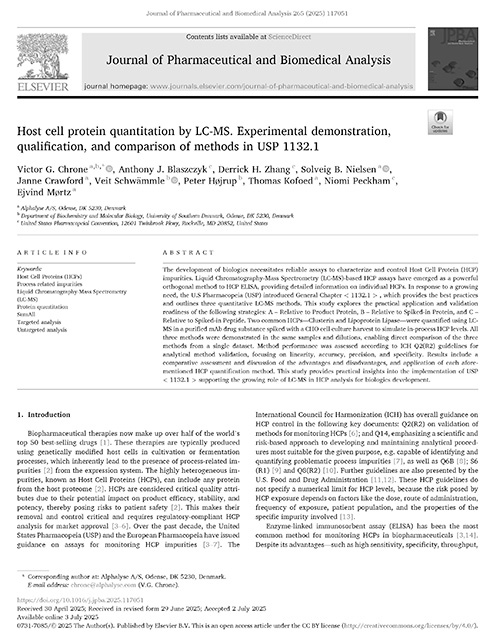Open-Access Article: Experimental Comparison of HCP Quantitation Methods using LC-MS

We are proud to share our latest research on advancing Host Cell Protein (HCP) quantification using LC-MS, now published:
“Host Cell Protein Quantitation by LC-MS. Experimental Demonstration, Qualification, and Comparison of Methods in USP 1132.1.”
This peer-reviewed article is the result of a successful collaboration between Alphalyse, the Faculty of Science, University of Southern Denmark, and the US Pharmacopeia.
Our thanks to the authors for their groundbreaking work: Victor Chrone, Anthony Blaszczyk, Derrick Zhang, Solveig Beck Nielsen, Janne Skaarup Crawford, Veit Schwämmle, Peter Højrup, Thomas Kofoed, Niomi Peckham, and Ejvind Mørtz.
Article abstract:
The development of biologics necessitates reliable assays to characterize and control Host Cell Protein (HCP) impurities. Liquid Chromatography-Mass Spectrometry (LC-MS)-based HCP assays have emerged as a powerful orthogonal method to HCP ELISA, providing detailed information on individual HCPs.
In response to a growing need, the U.S Pharmacopeia (USP) introduced General Chapter <1132.1>, which provides best practices and outlines three quantitative LC-MS methods.
This study explores the practical application and validation readiness of the following strategies:
A – Relative to Product Protein
B – Relative to Spiked-in Protein
C – Relative to Spiked-in Peptide
Two common HCPs—Clusterin and Lipoprotein Lipase—were quantified using LC-MS in a purified mAb drug substance spiked with a CHO cell culture harvest to simulate in-process HCP levels.
All three methods were demonstrated using the same samples and dilutions, allowing for a direct comparison of the three methods from a single dataset. Method performance was assessed according to ICH Q2(R2) guidelines for analytical method validation, focusing on linearity, accuracy, precision, and specificity.
Results include a comparative assessment and discussion of the advantages and disadvantages, as well as the application of each aforementioned HCP quantification method. This study provides practical insights into the implementation of USP supporting the growing role of LC-MS in HCP analysis for biologics development.
Read the article in full – through this open-access link:
https://doi.org/10.1016/j.jpba.2025.117051





















